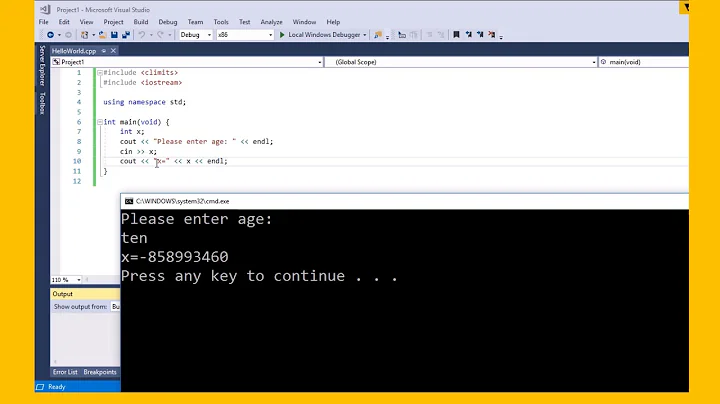How can I detect integer overflow on 32 bits int?
Solution 1
Math.addExact throws exception on overflow
Since Java 8 there is a set of methods in the Math class:
…and versions for long as well.
Each of these methods throws ArithmeticException if overflow happens. Otherwise they return the proper result if it fits within the range.
Example of addition:
int x = 2_000_000_000;
int y = 1_000_000_000;
try {
int result = Math.addExact(x, y);
System.out.println("The proper result is " + result);
} catch(ArithmeticException e) {
System.out.println("Sorry, " + e);
}
See this code run live at IdeOne.com.
Sorry, java.lang.ArithmeticException: integer overflow
Solution 2
long test = (long)x+y;
if (test > Integer.MAX_VALUE || test < Integer.MIN_VALUE)
// Overflow!
Solution 3
Try this way:
boolean isOverflow(int left, int right) {
return right > 0
? Integer.MAX_VALUE - right < left
: Integer.MIN_VALUE - right > left;
}
From: https://wiki.sei.cmu.edu/confluence/display/java/NUM00-J.+Detect+or+prevent+integer+overflow
Solution 4
Overflow can be detected by a logical expression of the most significant bit of the two operands and the (truncated) result (I took the logical expression from the MC68030 manual):
/**
* Add two int's with overflow detection (r = s + d)
*/
public static int add(int s, int d) throws ArithmeticException {
int r = s + d;
if (((s & d & ~r) | (~s & ~d & r)) < 0)
throw new ArithmeticException("int overflow add(" + s + ", " + d + ")");
return r;
}
Solution 5
The most intuitive method I can think of: calculate the sum (or difference) as a long, then convert that sum to an int and see if its value has changed.
long longSum = (long) a + b;
int sum = (int) longSum;
if (sum == longSum) {
// sum contains the correct result
} else {
// overflow/underflow
}
Remember that on modern 64 bit processors, working with longs is no less efficient than working with ints (the opposite may be true). So if you have a choice between checking for overflows or using longs, go for the latter.
Related videos on Youtube
ashur
Updated on October 23, 2020Comments
-
ashur over 3 years
I know such topic was asked several times, but my question is about overflow on full 32 bits of int. For example:
11111111111111111111111111111111 + 00000000000000000000000000000001 = 00000000000000000000000000000000 //overflow!I found topic with similar question about this, however the algorithm is not perfect.
11111111111111111111111111111111 + 00000000000000000000000000000000 = 00000000000000000000000000000000 //overflow!Is there any simple, fast, safer way to check this ?
-
 Ben Dale over 10 years
Ben Dale over 10 years -
 cellepo over 5 yearsBTW, Java int is always 32 bits (regardless of the architecture that your given JVM is running on [stackoverflow.com/questions/18017752/…): "By default, the int data type is a 32-bit signed two's complement integer, which has a minimum value of -231 and a maximum value of 231-1" (docs.oracle.com/javase/tutorial/java/nutsandbolts/…). So the 32-bit specification here seems to be a bit irrelevant/moot.
cellepo over 5 yearsBTW, Java int is always 32 bits (regardless of the architecture that your given JVM is running on [stackoverflow.com/questions/18017752/…): "By default, the int data type is a 32-bit signed two's complement integer, which has a minimum value of -231 and a maximum value of 231-1" (docs.oracle.com/javase/tutorial/java/nutsandbolts/…). So the 32-bit specification here seems to be a bit irrelevant/moot.
-
-
 cellepo over 5 yearsAre x & y assumed to be long's themselves? If they were instead int's, I don't think this would work (since the overflow would go undetected before the long cast); am I correct?
cellepo over 5 yearsAre x & y assumed to be long's themselves? If they were instead int's, I don't think this would work (since the overflow would go undetected before the long cast); am I correct? -
Tim B over 5 yearsYou are not correct. X gets cast to long before addition (precedence). long+int the int gets converted to long and you end up with long+long. Therefore the entire operation is done at 64 bit precision.
-
 cellepo over 5 yearsAh ok so the cast has precedence over the addition operator. Thanks!
cellepo over 5 yearsAh ok so the cast has precedence over the addition operator. Thanks! -
 expert over 5 yearsOverflow in
expert over 5 yearsOverflow inisOverflow(-47483648, -100000000)is not detected. -
ahmdx over 5 yearsThis is not an overflow actually :)
-
rveach almost 5 yearsJava 8's
addExactis coded asif (((s ^ r) & (d ^ r)) < 0).
![PicoCTF Walkthru [47] - flag_shop (Integer Overflow tutorial)](https://i.ytimg.com/vi/F5J6MG0mD-A/hq720.jpg?sqp=-oaymwEcCNAFEJQDSFXyq4qpAw4IARUAAIhCGAFwAcABBg==&rs=AOn4CLBUK6ZPt-PzPPUzNSvar-Mw-QUAWQ)





![Integer Overflows: When 15 + 1 doesn't equal 16 [Capture The Flag Fundamentals]](https://i.ytimg.com/vi/3qD3ybBwcFA/hq720.jpg?sqp=-oaymwEcCNAFEJQDSFXyq4qpAw4IARUAAIhCGAFwAcABBg==&rs=AOn4CLB5KM-WSNMx0ov7WBR8L4eTCRouLg)
